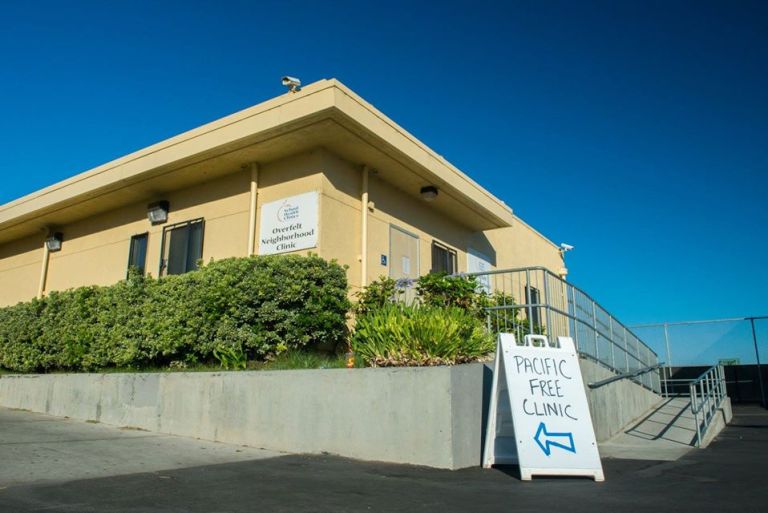On the morning of March 7, Pacific Free Clinic managers Andy Liu M.D. ’23 and Lillie Reed M.D. ’23 arrived early to shut the clinic amid coronavirus concerns.
“We are closing to minimize risk to patients and volunteers,” reads one of the signs they posted at the clinic’s door. Then, circled in red, in bold and underlined: “IF YOU THINK YOU MAY HAVE CORONAVIRUS, call a health professional, doctor or clinic for more information, and avoid contact with others.”
Pacific Free Clinic, based in San Jose, is one of the two Cardinal Free Clinics operated by the Stanford School of Medicine to provide healthcare at no charge to community members. The other, Arbor Free Clinic, is based in Menlo Park and has also been shut.
Together, the Pacific and Arbor free clinics see anywhere from 20 to 50 patients in one weekend, according to Baldeep Singh ’86, a clinical medicine professor and the medical director of Pacific Free Clinic. Of their patients, “almost all have no insurance,” he said.
Now that the clinics are closed, Singh said their patients “likely would be taken up by our county hospital affiliates.”
Normally, the clinics’ purpose is to act as a safety net, catching patients without healthcare and funneling them to a primary care physician who can provide sustained and regular care.
“We help patients get evaluated, get a basic screening and then we refer them to a primary care clinic in the area,” Liu said. “The primary care clinics we refer patients to operate on a sliding scale payment. We’ve established connections with them, so they’re not going to charge as much as some of the other practices in the county.”
The Cardinal Free Clinics are two of just over 1,000 free clinics in the U.S., which face unique barriers to providing healthcare to uninsured and underserved adults amid the coronavirus pandemic.
Following some states’ guidance to cancel non-essential medical care to minimize potential coronavirus spread, many clinics across the U.S. have instead taken to phoning or video calling patients to provide healthcare services.
Cardinal Free Clinics have not followed suit. One free clinic manager, who requested to remain anonymous out of fear of retaliation, told The Daily that the clinics are currently providing patients “essentially nothing, besides medicine refills for patients we have already seen.”
The manager told The Daily that “we did bring [telehealth] up with our medical directors and it seemed to me that Stanford is just not ready to handle the extra burden and hurdles.”
In an email to The Daily, Singh cited “huge logistical, legal and technological hurdles” preventing Cardinal Free Clinics from launching telehealth services. Most of the clinics’ student volunteers have moved off campus due to Santa Clara County’s shelter-in-place restrictions, Singh told The Daily.
“Our volunteer faculty and residents do not have the bandwidth to pursue an effective telehealth outreach strategy at this time, but we are looking into this in the future,” he wrote.
Singh added that Stanford Health Care, which supports the Cardinal Free Clinics, has “a secure portal for telephone and video visits.” Though Stanford Health Care is making “no special accommodations” now that the clinics are closed, Singh wrote that “we accept all patients who present to our clinics and [emergency department].”
On March 7, despite having called patients to cancel their appointments and posted a notice on their website, Liu, Reed and clinic manager Sierra Ha ’21 waited at the clinic so they could deliver news of the closure in person.
“Every few minutes, people were coming, knocking on the door,” Reed said.
It has been one month since closure, and concerned patients are still contacting the free clinics to seek care. Liu told The Daily he was called by a patient who had suspected coronavirus symptoms.
“I worry about patients like these,” he said. “And what I have to tell them all is essentially the same: ‘Go to our website. There are people who you can call to give you medical care.’ I don’t know if they will.”
Uninsured adults are less likely to make that next phone call, research has repeatedly shown. One in five uninsured adults did not seek needed medical care in 2018 due to cost, according to the Kaiser Family Foundation. So, even if they’re concerned about exposure to the virus, individuals without insurance may forego testing or care.
“We want to serve our patients and we want to be there for them,” Reed said. “But, we logistically can’t.”
Instead, Liu, Reed and Ha remained at the free clinic for six hours on the day of its closure, referring patients to community resources. Reed recalled a patient telling her in Spanish, “I know that you care. You wouldn’t be here doing this if you didn’t.”
After the patient left, Reed realized she had forgotten to share one crucial piece of information with him. She ran out of the clinic after him to deliver it: “We will reopen!”
The patient responded, “The community will be waiting here when you do.”
April 8, 11:30 a.m.: This article was corrected to reflect that Stanford Health Care accepts all patients who present to its clinics and emergency department, and to reflect Sierra Ha’s correct title. The Daily regrets these errors.
Contact Yasmin Rafiei at yrafiei ‘at’ stanford.edu.
